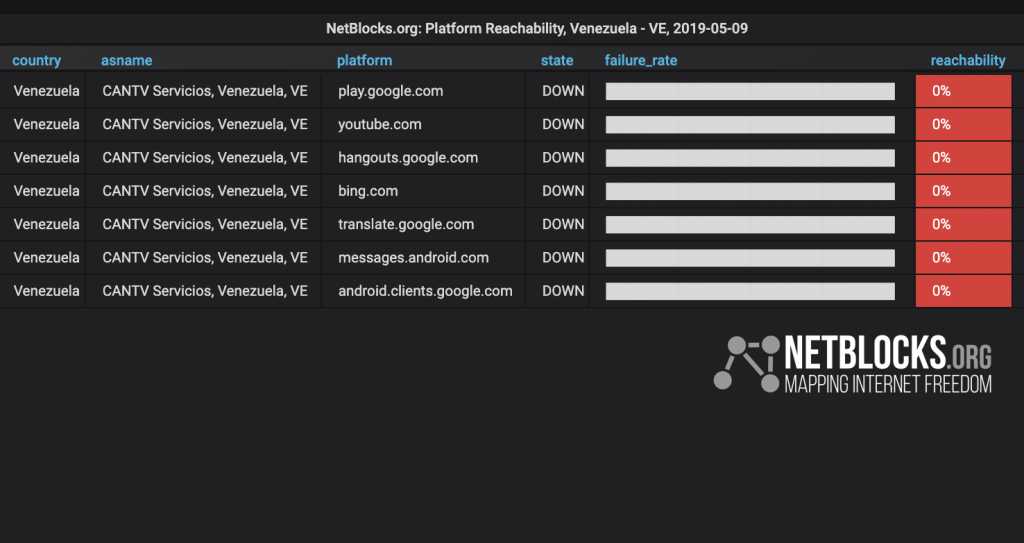Platform disruptions affecting multiple online platforms including YouTube, Google apps, Android backend servers and Microsoft Bing have been detected by the NetBlocks internet observatory on state provider ABA CANTV (AS8048), starting 5:00 a.m. UTC (1:00 a.m. VET) Thursday 9 May 2019 the morning after an armed ambush targeting National Assembly Vice President Edgar Zambrano.
Update: Access has been restored as of 7:55 a.m. UTC (3:55 a.m. VET):
Update: Services restored at 7:55 a.m. UTC (3:55 a.m. VET); early morning restrictions are rare in #Venezuela, with two notable recorded cases:
➖7 March, before the first power grid failure
➖30 April, during and after the uprising ⬇️https://t.co/vN6DEcL2Xr— NetBlocks (@netblocks) May 9, 2019
The disruption lasted three hours and followed public outcry and international condemnation of the politician’s detection.
Confirmed: YouTube, Google services, Android backend servers and Bing restricted in #Venezuela from 5:00 a.m. UTC (1:00 a.m. VET) amid outcry and international condemnation over #Zambrano ambush; incident ongoing #9May #KeepItOn ⬇️https://t.co/vN6DEcL2Xr pic.twitter.com/JYYmKRFNlj
— NetBlocks (@netblocks) May 9, 2019
As reports of the ambush emerged, Venezuela’s National Assembly alerted the public to the crisis through social media platforms and supporters began a vigil.
Restrictions typically target prime time public appearances and early morning platform blocks are comparatively rare, with two recorded incidents of similar scale:
- 7 March 2019: The morning before Venezuela’s first national power grid failure, YouTube was unavailable for over 20 hours
- 30 April 2019: Multiple services were restricted for a prolonged period amid a popular uprising
Streaming services were previously restricted while Juan Guaidó made a statement on the situation of Zambrano on 3 May 2019. The politician is among a group accused of conspiracy, rebellion and treason by Venezuela’s Supreme Court, following an attempted uprising on 30 April.
The NetBlocks web probe chart shows overall reachability of the affected platforms across Venezuela, based on network performance measurement data collected from 20 vantage points across the country.
Internet censorship in Venezuela has become increasingly pronounced in recent days, with a series of major disruptions during and after the uprising of April 30 2019.
NetBlocks studies in recent days have produced technical evidence of targeted censorship targeting political activist Leopoldo Lopez and a meeting of oil industry workers.
The new disruptions show the continuation of ephemeral, or intermittent internet censorship imposed by the state appearing to target critical speech. Data are consistent with previous targeted disruptions during public appearances by Juan Guaidó, and during sessions of Venezuela’s National Assembly. Connectivity returns when adversary Nicolás Maduro and his officials address the population.
Venezuela saw a remission in ephemeral network filtering during the nationwide power outages through March. News media and campaign website filters remained in place throughout that period and intermittent censorship resumed even as much of the country remained offline due to chronic power grid failures.
Past incidents of network filtering in Venezuela have lasted from twelve minutes to over twenty hours, when YouTube was restricted hours before the country’s first nationwide power outage. Network data indicates that the platform disruptions are consistent with methods used to block online content in Venezuela.
Methodology
Internet performance and service reachability are determined via NetBlocks web probe privacy-preserving analytics. Each measurement consists of latency round trip time, outage type and autonomous system number aggregated in real-time to assess service availability and latency in a given country. Network providers and locations are enumerated as vantage point pairs. The root cause of a service outage may be additionally corroborated by means of traffic analysis and manual testing as detailed in the report.
NetBlocks is an internet monitor working at the intersection of digital rights, cyber-security and internet governance. Independent and non-partisan, NetBlocks strives to deliver a fair and inclusive digital future for all.
[ press | contact ] Graphics and visualizations are provided for fair use in unaltered form reflecting the meaning and intent in which they were published, with clear credit and source attribution to NetBlocks. Intellectual property rights are protected including but not limited to key findings, facts and figures, trademarks, copyrights, and original reporting, are held by NetBlocks. Citation and source attribution are required at the point of use.

